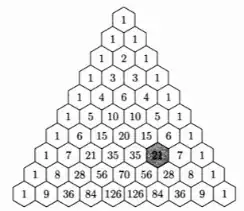Consider the hexed version of Pascal's triangle shown in the figure here:
Note further that the shaded entry $21$ on the right side is surrounded by six numbers: $6$, $15$, $35$, $56$, $28$, $7$. Note further that$$6 \times 35 \times 28 = 15 \times 56 \times 7.$$Will this pattern hold for any number we choose in the triangle? Prove that it does or find a counterexample.
The question is asking if we have the equality$$\binom{n-1}{k}\binom{n}{k-1}\binom{n+1}{k+1} = \binom{n-1}{k-1}\binom{n}{k+1}\binom{n+1}{k}$$Expanding we get$${{(n-1)!}\over{k!(n-k-1)!}} {{n!}\over{(k-1)!(n-k+1)!}} {{(n+1)!}\over{(k+1)!(n-k)!}} = {{(n-1)!}\over{(k-1)!(n-k)!}} {{n!}\over{(k+1)!(n-k-1)!}} {{(n+1)!}\over{k!(n-k+1)!}}$$Cancelling like terms on both sides it's clear the equality follows.
However, this was not a combinatorial proof. I was wondering if someone can give me a hint (NOT A COMPLETE SOLUTION) towards a combinatorial proof of this equality? My thoughts are to show an equality between $2$ ways to count certain types of paths that pass through $2$ specific fixed points (that aren't the starting point nor the endpoint) in a $n \times n \times n$ grid.
